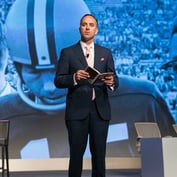(Bloomberg) — Federal Reserve Bank of St. Louis President James Bullard said the U.S. central bank’s policy setting is “extreme” and it’s time to start moving the benchmark lending rate and balance sheet “toward more normal levels.”
“I continue to be an advocate for beginning policy normalization,” Bullard told a Philadelphia Fed conference Friday, according to his prepared remarks.
U.S. central bankers hold their last meeting of the year on Dec. 15-16 and are widely expected to raise the benchmark federal funds rate, which has been held near zero since December 2008.
Fed Chair Janet Yellen told the congressional Joint Economic Committee on Thursday that household spending appeared “solid” and a rate hike this month was a “live option.”
A series of strong jobs reports are giving U.S. central bankers confidence that they can raise borrowing costs slightly and still count on inflation rising gradually back toward their 2 percent target.








 December 07, 2015 at 12:01 AM
December 07, 2015 at 12:01 AM









